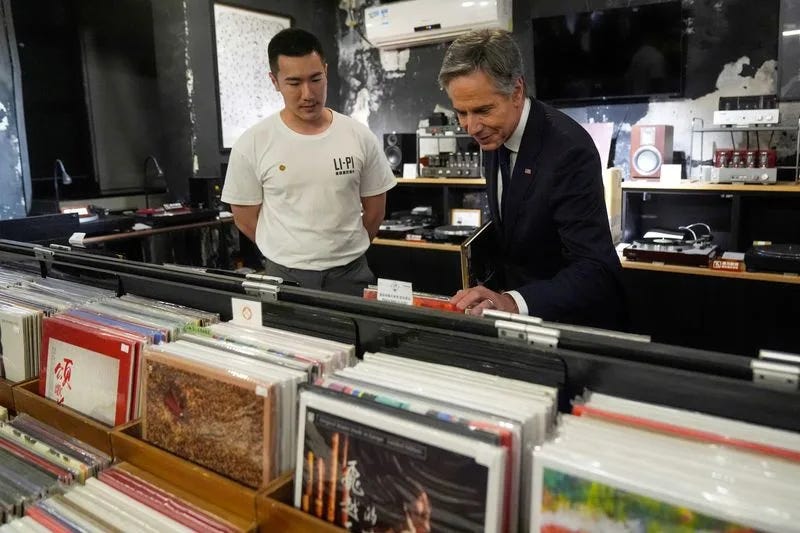A deeply uncomfortable tone-deaf WHCD weekend
Plus Blinken's warning to China, a space race with Russia and the US gets kicked out of the Sahel


Cosmopolitans! Apologies this edit is late. It was a strange week, and even stranger weekend, in DC.
Last night was the annual White House Correspondents' Dinner, where politicians and the press dress up for a mediocre meal in a packed DC ballroom. President Biden and SNL's Colin Jost delivered speeches sprinkled with semi-controversial jokes, most of them about former President Donald Trump.
I've attended about a dozen of these dinners over the years, but opt out these days. Over time, the "nerd prom," as it’s affectionately known, has morphed into an orgy of high-profile parties where visibility is currency—measured by the stack of exclusive invites one receives. Nowadays, I am invited to a few, excluded from others, and that’s just how it goes when you’re not with a top-tier outlet like CNN.
Frankly, I'm relieved to be less visible. The premise of the WHCD—that the press and politicians they cover are one big, happy family—has never sat well with me. Sure, I enjoy an occasional drink or meal with a source to nurture relationships that aid my reporting. However, Washington has grown too incestuous for comfort, where socializing often translates to trading access for acquiescence.
Plus, some of this week's somber events left me less than eager to celebrate. On Thursday, I attended a memorial for the World Central Kitchen workers killed last month in Gaza at the Washington National Cathedral. We remembered the seven lives lost—heroes hailed by José Andrés as "the best of humanity." The Washington Post wrote a beautiful story on the service.
I also moderated a panel discussion with family members and colleagues of detained reporters and formerly imprisoned journalists: Austin Tice's mother Deborah, who has spent 12 years trying to bring her son home from Syria, the Wall Street Journal’s Paul Beckett, who has been tirelessly working to free Evan Gershkovich and Pavel Butorin, who traveled from Prague to press the U.S. government for the release of his wife, Alsu Kurmasheva, a journalist jailed in Russia for the past six months. Thankfully President Biden mentioned them all last night in his remarks.
The memory of journalists who have died in Gaza and elsewhere also cast a shadow over the festivities, as did the tension about the war on college campuses. - and at protests outside the hotel where the main dinner was being held.
The WHCD weekend is, in theory, a celebration of press freedom with glitz and glamour. But this year, participating in lighthearted revelries was not only jarring but also deeply uncomfortable.
The one bright spot this year? Substack. And I'm not just saying this because I write here.
This weekend we celebrated the one-year anniversary of the Substack
The publication offers a fresh perspective on the war in Ukraine and other regions plagued by authoritarianism. It's filled with compelling human interest stories often overshadowed by political debates in Washington. Tim's work has been a significant inspiration for Cosmopolitics and I'm looking forward to seeing how 'The Counteroffensive' expands its coverage to new areas and further explores the human and cultural impacts of war.Last night, Substack co-founder
, and head of , hosted a 'New Media Party' on the sidelines of the White House Correspondents' Dinner. The event gathered Substack writers and Washington notables, focusing not on elitism but on fostering a community and dialogue of ideas. And yes, it was fun! Hamish addressed the crowd, highlighting Substack's commitment to nurturing new voices and providing a platform unbound by traditional media's constraints.Substack isn’t tied to any political party. It transcends simple political labels, offering a platform for everyone. For those on the right, it champions free markets and liberty. For the left, it's a space to voice dissent and champion the oppressed— a testament to its broad appeal and commitment to free expression.
This is the essence of Substack. Free from the commercial constraints and formulas of legacy media, Substack empowers us to deliver fearless, incisive coverage that’s directly accountable to our subscribers. Your support enables us to continue providing the insightful stories and analyses that matter most to you.
Now, on to the news:….
Blinken’s bad blood in China
Secretary of State Antony Blinken's recent trip to Beijing underscored the growing rifts amid ongoing attempts at diplomacy. Despite discussing cooperation on various fronts, including artificial intelligence and military communications, the conversations revealed deep-seated strategic disagreements.
Keep reading with a 7-day free trial
Subscribe to Cosmopolitics by Elise Labott to keep reading this post and get 7 days of free access to the full post archives.




